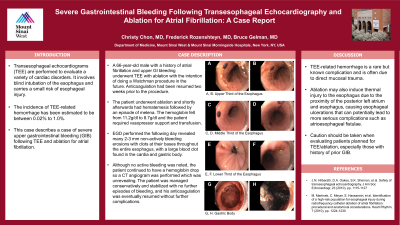Back


Poster Session C - Monday Afternoon
Category: GI Bleeding
C0327 - Severe Gastrointestinal Bleeding Following Transesophageal Echocardiography and Ablation for Atrial Fibrillation: A Case Report
Monday, October 24, 2022
3:00 PM – 5:00 PM ET
Location: Crown Ballroom

Has Audio

Christy Chon, MD
Icahn School of Medicine at Mount Sinai Morningside-West
New York, NY
Presenting Author(s)
Christy Chon, MD, Frederick Rozenshteyn, MD, Bruce Gelman, MD
Icahn School of Medicine at Mount Sinai Morningside-West, New York, NY
Introduction: Transesophageal echocardiograms (TEE) are performed to evaluate a variety of cardiac disorders. It involves blind intubation of the esophagus and carries a small risk of esophageal injury. This case describes a case of severe upper gastrointestinal bleeding (GIB) following TEE and ablation for atrial fibrillation.
Case Description/Methods: A 66-year-old male with a history of atrial fibrillation and upper GI bleeding underwent TEE with ablation with the intention of doing a Watchman procedure in the future. Anticoagulation had been resumed two weeks prior to the procedure. The patient underwent ablation and shortly afterwards had hematemesis followed by an episode of melena. The hemoglobin fell from 11.2g/dl to 8.7g/dl and the patient required vasopressor support and transfusion. EGD revealed many 2-3 mm non-actively bleeding erosions with clots at their bases throughout the entire esophagus, with a large blood clot found in the cardia and gastric body (Figure 1). Although no active bleeding was noted, the patient continued to have a hemoglobin drop so a CT angiogram was performed which was unrevealing. The patient was managed conservatively and stabilized with no further episodes of bleeding, and his anticoagulation was eventually resumed without further complications.
Discussion: This case illustrates the occurrence of gastrointestinal erosions and bleeding following TEE and ablation. Severe gastrointestinal hemorrhage is a rare but known adverse event associated with TEE and ablation. The incidence of TEE-related hemorrhage has been estimated to be between 0.02% to 1.0% and is often due to direct mucosal trauma1. Ablation may also induce thermal injury to the esophagus due to the proximity of the posterior left atrium and esophagus, causing esophageal ulcerations that can potentially lead to more serious complications such as atrioesophageal fistulae2. Caution should be taken when evaluating patients planned for such procedures, especially those with history of prior GIB, and anticoagulation should be held if possible.
1. J.N. Hilberath, D.A. Oakes, S.K. Shernan, et al. Safety of transesophageal echocardiography. J Am Soc Echocardiogr, 23 (2010), pp. 1115-1127
2. M. Martinek, C. Meyer, S. Hassanein, et al. Identification of a high-risk population for esophageal injury during radiofrequency catheter ablation of atrial fibrillation: procedural and anatomical considerations. Heart Rhythm, 7 (2010), pp. 1224-1230

Disclosures:
Christy Chon, MD, Frederick Rozenshteyn, MD, Bruce Gelman, MD. C0327 - Severe Gastrointestinal Bleeding Following Transesophageal Echocardiography and Ablation for Atrial Fibrillation: A Case Report, ACG 2022 Annual Scientific Meeting Abstracts. Charlotte, NC: American College of Gastroenterology.
Icahn School of Medicine at Mount Sinai Morningside-West, New York, NY
Introduction: Transesophageal echocardiograms (TEE) are performed to evaluate a variety of cardiac disorders. It involves blind intubation of the esophagus and carries a small risk of esophageal injury. This case describes a case of severe upper gastrointestinal bleeding (GIB) following TEE and ablation for atrial fibrillation.
Case Description/Methods: A 66-year-old male with a history of atrial fibrillation and upper GI bleeding underwent TEE with ablation with the intention of doing a Watchman procedure in the future. Anticoagulation had been resumed two weeks prior to the procedure. The patient underwent ablation and shortly afterwards had hematemesis followed by an episode of melena. The hemoglobin fell from 11.2g/dl to 8.7g/dl and the patient required vasopressor support and transfusion. EGD revealed many 2-3 mm non-actively bleeding erosions with clots at their bases throughout the entire esophagus, with a large blood clot found in the cardia and gastric body (Figure 1). Although no active bleeding was noted, the patient continued to have a hemoglobin drop so a CT angiogram was performed which was unrevealing. The patient was managed conservatively and stabilized with no further episodes of bleeding, and his anticoagulation was eventually resumed without further complications.
Discussion: This case illustrates the occurrence of gastrointestinal erosions and bleeding following TEE and ablation. Severe gastrointestinal hemorrhage is a rare but known adverse event associated with TEE and ablation. The incidence of TEE-related hemorrhage has been estimated to be between 0.02% to 1.0% and is often due to direct mucosal trauma1. Ablation may also induce thermal injury to the esophagus due to the proximity of the posterior left atrium and esophagus, causing esophageal ulcerations that can potentially lead to more serious complications such as atrioesophageal fistulae2. Caution should be taken when evaluating patients planned for such procedures, especially those with history of prior GIB, and anticoagulation should be held if possible.
1. J.N. Hilberath, D.A. Oakes, S.K. Shernan, et al. Safety of transesophageal echocardiography. J Am Soc Echocardiogr, 23 (2010), pp. 1115-1127
2. M. Martinek, C. Meyer, S. Hassanein, et al. Identification of a high-risk population for esophageal injury during radiofrequency catheter ablation of atrial fibrillation: procedural and anatomical considerations. Heart Rhythm, 7 (2010), pp. 1224-1230

Figure: Figure 1.
A: Non-actively bleeding 3mm erosion with clot at its base in the upper third of the esophagus.
B: Large blood clot in the gastric body.
A: Non-actively bleeding 3mm erosion with clot at its base in the upper third of the esophagus.
B: Large blood clot in the gastric body.
Disclosures:
Christy Chon indicated no relevant financial relationships.
Frederick Rozenshteyn indicated no relevant financial relationships.
Bruce Gelman indicated no relevant financial relationships.
Christy Chon, MD, Frederick Rozenshteyn, MD, Bruce Gelman, MD. C0327 - Severe Gastrointestinal Bleeding Following Transesophageal Echocardiography and Ablation for Atrial Fibrillation: A Case Report, ACG 2022 Annual Scientific Meeting Abstracts. Charlotte, NC: American College of Gastroenterology.
